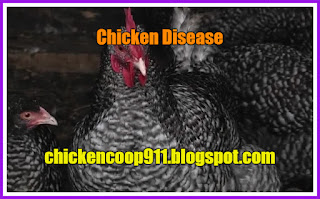If you suspect that one of your chickens is ill, immediately remove it from the vicinity of the flock. This is to help prevent any disease from spreading.
Each day when you feed and water your chickens do a visual inspection. Make sure there aren’t any chickens with dirty feathers around the anus that may signal diarrhea, and that their eyes and nostrils are clear with no drainage. Be aware of chickens that are reluctant to get up and walk. Decreased food and water intake or a slowdown in egg production can also be symptoms of illness.
Avian Flu symptoms are respiratory distress, diarrhea, and lack of interest in food, decreased egg laying. This disease goes through a flock quickly. Antibiotics, rest, and hope for the best is about all you can do. Broad spectrum antibiotic do sometimes work if the chickens immune system is strong before acquiring the disease. There is a vaccine available for chickens, but it is limited to qualifying flocks.
Infectious Sinusitis is a sinus infection that is considered chronic. The chickens present with sneezing, swollen nares, discharge from the nares and eyes. Antibiotics given through their food and water are very effective for this condition.
Bird Pox is sometimes called Chicken Pox but it is not the same as the human version. The chickens have congestion along with flesh that may look raw with warty type bumps. The most obvious appearance is on the legs. The vaccine for this disease is effective, but once the chickens have the disease there is no available treatment.
Eye Worms is a species of roundworm that your chickens can get from earthworms, crickets, flies or anything that has eaten the larva. Symptoms are swollen eyes with white discharge from the eyes and mouth. The white chunks are the larva of the mature worm. Worm your chickens at least every 6 months with a good broad spectrum wormer. If the larval symptom appears, clean and disinfect coop and pens. If you don’t kill the larva the cycle will keep repeating itself.
This is just a short selection of the more common chicken diseases, but prevention is always easier than the cure. Keep your chicken pens clean, provide vaccines, and pay special attention to nutritious food and clean water.
Source: chickencoopplansonline.com/chicken-disease
Each day when you feed and water your chickens do a visual inspection. Make sure there aren’t any chickens with dirty feathers around the anus that may signal diarrhea, and that their eyes and nostrils are clear with no drainage. Be aware of chickens that are reluctant to get up and walk. Decreased food and water intake or a slowdown in egg production can also be symptoms of illness.
Prevention
In order to prevent sickness in poultry there are four major considerations.
- Have your day old chicks vaccinated before they are shipped. In most hatcheries this is a nominal charge per chick and well worth the extra change. The vaccinations can save you a search for an avian veterinarian and exorbitant costs.
- Keep cages, food and water containers, and nesting areas clean. Regular cleaning keeps illness at bay, and can save a flocks demise from one ill chicken.
- Use chicken feed that contains low dose antibiotics for continuous protection against many bacterial infections.
- Use variety in feeding your flock to make sure they get a balance of vitamins, minerals, protein and carbohydrates. When you are supplementing with veggies, don’t forget peelings from citrus fruits for vitamin C.
Some Common Chicken Diseases
Bronchitis symptoms are difficulty breathing (gasping), discharge from eyes and nares, avoidance of food and water. Increase the chicken’s ambient temperature by 5 degrees Fahrenheit, and give antibiotics.Avian Flu symptoms are respiratory distress, diarrhea, and lack of interest in food, decreased egg laying. This disease goes through a flock quickly. Antibiotics, rest, and hope for the best is about all you can do. Broad spectrum antibiotic do sometimes work if the chickens immune system is strong before acquiring the disease. There is a vaccine available for chickens, but it is limited to qualifying flocks.
Infectious Sinusitis is a sinus infection that is considered chronic. The chickens present with sneezing, swollen nares, discharge from the nares and eyes. Antibiotics given through their food and water are very effective for this condition.
Bird Pox is sometimes called Chicken Pox but it is not the same as the human version. The chickens have congestion along with flesh that may look raw with warty type bumps. The most obvious appearance is on the legs. The vaccine for this disease is effective, but once the chickens have the disease there is no available treatment.
Eye Worms is a species of roundworm that your chickens can get from earthworms, crickets, flies or anything that has eaten the larva. Symptoms are swollen eyes with white discharge from the eyes and mouth. The white chunks are the larva of the mature worm. Worm your chickens at least every 6 months with a good broad spectrum wormer. If the larval symptom appears, clean and disinfect coop and pens. If you don’t kill the larva the cycle will keep repeating itself.
This is just a short selection of the more common chicken diseases, but prevention is always easier than the cure. Keep your chicken pens clean, provide vaccines, and pay special attention to nutritious food and clean water.
Source: chickencoopplansonline.com/chicken-disease






0 Comments:
Post a Comment